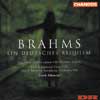Brahms Ein Deutsches Requiem, 'German Requiem'
Sensible, yes – but this masterwork would benefit from a more animated approach
View record and artist detailsRecord and Artist Details
Composer or Director: Johannes Brahms
Genre:
Vocal
Label: Chandos
Magazine Review Date: 9/2003
Media Format: CD or Download
Media Runtime: 67
Mastering:
Stereo
DDD
Catalogue Number: CHAN10071

Tracks:
| Composition | Artist Credit |
|---|---|
| (Ein) Deutsches Requiem, 'German Requiem' |
Johannes Brahms, Composer
Bo Skovhus, Baritone Danish National Radio Choir Danish National Radio Symphony Orchestra Gerd Albrecht, Conductor Inger Dam-Jensen, Soprano Johannes Brahms, Composer |
Author: John Steane
‘How slow!’ one thinks, as the opening bars insist on the rule of Time, the great comforter. A few years ago we probably would have merely accepted it, for the 10'25" of this single- tempo movement is certainly not an unusually long duration (of the 19 recordings in front of me now, only three take decisively faster speeds, three are roughly the same, and the rest, 13, are slower, some of them considerably). But of the three quicker versions, two (Norrington and Gardiner) have been particularly influential. These (at 9'50" and 8'48" respectively) have shown that the questionable metronome marking in some scores can be taken (as, for instance, Bruno Walter did) without cost to reverence, solemnity or expressiveness. Gerd Albrecht’s speeds throughout are quite moderate and sensible. Yet over the years it’s the animation of this Requiem, rather than its serenity, that has come ever more clearly to light, and I haven’t found that this recording helps the revelation on its way.
Prominent among its virtues is the excellence of its choir. The blend and quality of voices recall the Philharmonia in their great days under Klemperer; but there is a notable difference in that they, in 1961, were recorded as being, with their words, the protagonist, whereas here, following normal modern practice, they are somewhat distanced and we have less immediate contact. The orchestral playing is also fine, with the clarity of these finely coloured, intermingling strands a priority. Again I don’t find a strong feeling for the more dramatic element in the score – the thrust of brass in the crescendi of ‘Denn alles Fleisch’ (‘For all flesh…’), for instance, or the triumphant ‘Tod, wo ist dein Stachel?’ (‘Death, where is thy sting?’) or the ‘Jacob’s ladder’ passages a little later. The soloists have similarly qualified success, Inger Dam-Jensen (nicely balanced with the choir) having a sufficiently broad span of phrase but not quite the comforter’s tone, and Bo Skovhus an authority more secular than spiritual.
It’s an enjoyable version, but Brahms’s Requiem is a masterwork and deserves time spent over choice. I still go back first to Klemperer; among recent standard performances, Hickox; and for a new look (a refreshing and inspiring one) to Norrington.
Prominent among its virtues is the excellence of its choir. The blend and quality of voices recall the Philharmonia in their great days under Klemperer; but there is a notable difference in that they, in 1961, were recorded as being, with their words, the protagonist, whereas here, following normal modern practice, they are somewhat distanced and we have less immediate contact. The orchestral playing is also fine, with the clarity of these finely coloured, intermingling strands a priority. Again I don’t find a strong feeling for the more dramatic element in the score – the thrust of brass in the crescendi of ‘Denn alles Fleisch’ (‘For all flesh…’), for instance, or the triumphant ‘Tod, wo ist dein Stachel?’ (‘Death, where is thy sting?’) or the ‘Jacob’s ladder’ passages a little later. The soloists have similarly qualified success, Inger Dam-Jensen (nicely balanced with the choir) having a sufficiently broad span of phrase but not quite the comforter’s tone, and Bo Skovhus an authority more secular than spiritual.
It’s an enjoyable version, but Brahms’s Requiem is a masterwork and deserves time spent over choice. I still go back first to Klemperer; among recent standard performances, Hickox; and for a new look (a refreshing and inspiring one) to Norrington.
Discover the world's largest classical music catalogue with Presto Music.

Gramophone Digital Club
- Digital Edition
- Digital Archive
- Reviews Database
- Full website access
From £8.75 / month
Subscribe
Gramophone Full Club
- Print Edition
- Digital Edition
- Digital Archive
- Reviews Database
- Full website access
From £11.00 / month
Subscribe
If you are a library, university or other organisation that would be interested in an institutional subscription to Gramophone please click here for further information.




